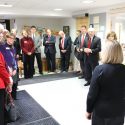Workshop to focus on policy innovation for environmental, economic gain
How can the U.S. and the European Union find solutions to environmental problems while also supporting the economy? Eight Europeans with expertise in creating and using new policies to meet 21st century environmental and economic challenges will be in Madison June 19 at Monona Terrace as part of an open-to-the-public "international dialogue on ecological policy" co-sponsored by the University of Wisconsin–Madison.
The UW–Madison Center for World Affairs and the Global Economy (WAGE), European Union Center of Excellence (EUCE) and La Follette School of Public Affairs are sponsoring: "Innovative Environmental Governance and Regulation in the European Union: Any Lessons for the U.S.?"
The experts from business, government, non-government and academic sectors will cover a range of topics, including river protection, efficient permitting, product stewardship, chemical use and environmental-business cooperation.
The workshop falls within the June 17-20 conference of the Multi-State Working Group on Environmental Performance (MSWG), a network with about 1,000 business, government, non-government and academic members in 30 states and 20 countries. Since 1996, MSWG has been a "voice for ecological innovation and integration," favoring collaborative and systems-based approaches to environmental protection and sustainability.
"We will offer public officials, business persons and citizens access to policy experts and players they could never otherwise meet," says Jonathan Zeitlin, director of both the EUCE and WAGE. "The Wisconsin Idea is at work to help our citizens and leaders meet the environmental and economic challenges we face in each community and at every level."
The program was designed to be useful to those who make, implement and are subject to policy. Time will be provided for questions and discussion.
The workshop is open to the public with daily workshop registration at or conference-long registration. The EU session is limited to 150 people on a first-come, first-served basis to facilitate discussion. The MSWG conference expects up to 400 people with sessions on inter-connected environmental, economic and energy issues in Asia, Australia, the Americas and Europe. China will be highlighted.
Zeitlin says communities and countries are looking to policy innovation to meet environmental challenges, remain economically competitive and live within tight government budgets.
"We made great environmental progress in the last 30 years, but new tools and new mixes of old tools are required for the next 30 years," he adds. "The European Union has become an international leader in developing innovative approaches to environmental governance and regulation, which are increasingly relevant to the U.S. and other world regions."
For more information, contact Alison Alter, associate director of WAGE, at (608) 262-9774 or abalter@wisc.edu.



